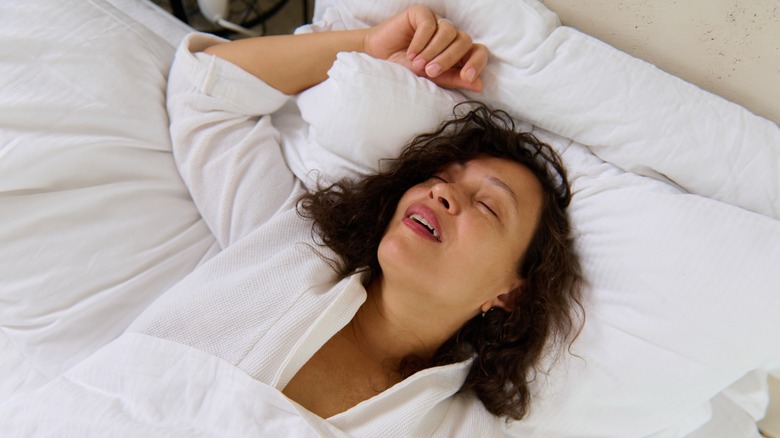This Staggering Statistic Is Why You Shouldn't Ignore Snoring
Sleep partners will roll their eyes when the subject of snoring comes up. Snoring is a secret that no one likes to admit, but Johns Hopkins Medicine says that as many as 45% of people occasionally snore. One in four people are chronic snorers, leading to many sleep disruptions for the snorers and their partners. A 2015 article in Laryngoscope found that snorers had logged less overall sleep, more days of inadequate sleep, and more days of unintentional sleep episodes a month.
Snoring can be the result of excess weight, alcohol consumption, nasal congestion, or sleeping on your back. People who've never snored their entire lives might find themselves snoring as they get older. Snoring could also be a symptom of obstructive sleep apnea, which means that something is blocking your ability to breathe. An apnea is considered to be a brief episode when the air is completely blocked for at least 10 seconds. These apneas or reduced air flow episodes can occur while someone is snoring or during other times of the night.
If you or your partner are chronic snorers, it's important to check for sleep apnea. According to a 2014 article in the Journal of Clinical Sleep Medicine, people who have moderate or severe sleep apnea have a four-fold higher death risk from any cause.
Sleep apnea and other conditions increase your risk of death
This 2014 article in the Journal of Clinical Sleep Medicine also found that sleep apnea can be associated with other health risks. You're three times more likely to die from cancer if you also have sleep apnea. You're also more than twice as likely to develop cancer and 3.7 times more likely to have a stroke.
Having comorbidities such as type 2 diabetes, cardiovascular disease, or cancer can also factor into your risk of early death, according to a 2017 article in the Annals of Medicine. Compared to people who only had sleep apnea, the death risk of those with more comorbidities can be 38 times higher.
Getting enough sleep each night is important for your health, and sleep apnea can disrupt your ability to sleep. That reduced sleep also factors into your early death risk. A 2023 article in JAMA Network Open followed the sleep behaviors of people with sleep apnea for about 11 years. People who slept between 6 and 7 hours each night had a 53% higher risk of death compared to people who got at least 7 hours of shut-eye. Getting less than 5 hours of sleep resulted in a 64% increased risk of death from any cause.
How to diagnose and treat sleep apnea
If you or your partner suspect you might have sleep apnea, your doctor will ask several questions about your daytime sleepiness, family history, and other possible symptoms. You'll also need a physical exam to check your weight, blood pressure, and neck circumference because they can be risk factors for sleep apnea. You might need to participate in a sleep study to get an accurate diagnosis, but there are also home sleep apnea tests. A sleep study will require attaching electrodes to your head to record electrical signals while you sleep. Your breathing and blood oxygen levels will also be monitored. A sleep disorder specialist will analyze the data to determine a sleep apnea diagnosis and its severity.
Your treatment for sleep apnea depends on the level of severity. If you have less than 15 sleep apneas or reduced breathing episodes an hour, it's considered mild. Moderate sleep apnea will range between 15 and 30 times an hour, and people with severe sleep apnea have more than 30 episodes an hour. Some people will require sleeping with a continuous positive airway pressure (CPAP) machine to open up the airways to help with breathing. Others might be fitted for a mouthpiece so your tongue or jaw doesn't block your air passages. Sleep apnea might also require lifestyle changes such as maintaining good sleep hygiene, losing weight, and exercising. Severe cases of sleep apnea might require surgery or nerve stimulation.


